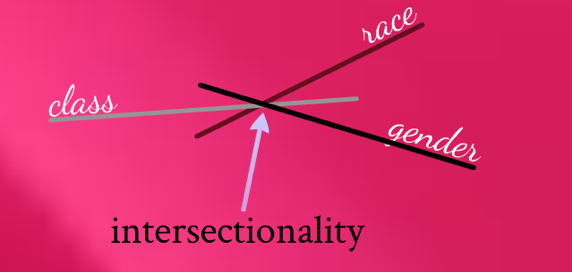Dear Dub: Buzzword Background of Intersectionality
Have you heard the word ‘intersectionality’? Absolutely? Maybe in a lecture? Never? You think you saw it on Instagram that one time?
I feel like it’s been all over the place lately. Which I guess makes sense, because even though it has a longer history, it wasn’t added to dictionaries until about five years ago, which is kinda crazy to me. There’s been an increased awareness around social justice and discrimination issues, or at least an increased outspokenness about it, especially on social media. Social media is an easy way to share ideas and call for change, but with that, there is also the world of performative activism and buzzwords. So, if you’re gonna repost something, I think you should at least think about the history that the words or ideas have.
It has the word ‘intersection’ in it, which makes sense because it is defined as the “complex way in which the effects of multiple forms of discrimination (such as racism, sexism, and classism) combine or overlap, especially in the experiences of marginalized individuals or groups” (Merriam Webster). I usually see ‘intersectional’ bumped up against another word like environmentalism, feminism, or identity. It’s increased mainstream use hopefully means that people are thinking about unique experiences of oppression. But, it’s also made me wonder: do people know where the term comes from? Do I really? Does it matter? I think it does.
So, the word. It’s credited to somebody named Kimberlé Crenshaw, who first published it in a paper in 1989. The paper was looking at how feminist theory and antidiscrimination laws failed to address the experiences of Black women, becuase they only focused on an isolated part of that identity. Even though that was the first use of the word intersectionality, the concept had been simmering for a while.
In the 60’s and 70’s, feminist movement, as well as the Civil Rights movement were going on in the US. The mainstream feminist movement was focused on issues white women brought forward, which often were not things Black feminists identified with. At the same time, Black women participating in the Civil Rights movement were met with sexism, and often weren’t allowed to hold leadership positions. Black women needed to be a part of both of these movements, but didn’t find what they needed in either, because being Black and being a woman were looked at separately. In response to this frustration, a group called the Combahee River Collective, a Black feminist lesbian organization, wrote a statment about how Black feminism was needed to combat the ways race and gender togther effect their lives. About ten years later, Crenshaw’s article was published, using the word ‘intersectionality’ as a way to talk about this idea.
Was that a bit of a history lesson? Yeah, but I think we need to know where stuff comes from. And, when we learn about and acknowledge the history of a word or idea, that also helps us to move away from purely performative activism. Intersectionality is now used to describe much more than just the intersection of race and gender, but also parts of our identity like sexuality, economic status, and ability. I think it’s so great that a word that talks about these unique personal identities is becoming more mainstream, but I also think we need to remember where the word came from, and give credit where credit is due. In this case, to Kimberle Crenshaw, the Combahee River Collective, and the social movements that supported them.
This month is Black History month, so I want you to think: what other ideas, things, or words have a meaningful or ignored history that you are unaware of?



